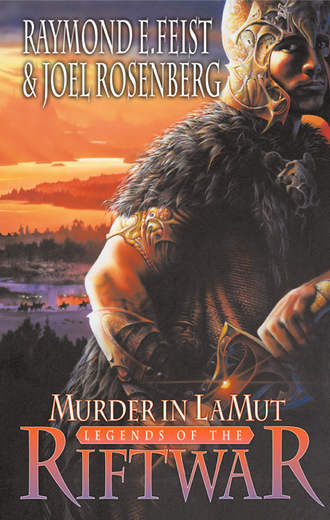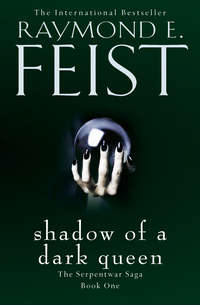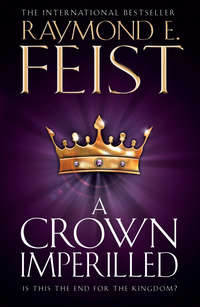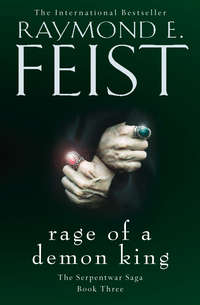
Полная версия
Murder in Lamut
Vandros grinned. ‘I think my father should have chosen a good LaMutian as Swordmaster rather than some effete Easterner. Rillanon may be a good place to learn the fine points of swordsmanship, but I think that there is something about the Court that breeds not only conspiracy, but the suspicion of conspiracy, whether one exists or not.’
‘There are always conspiracies, my lord, somewhere.’
Vandros’s face darkened for a moment, and even though it remained unspoken, Argent knew what had passed through his mind. The rift between the King and the Prince of Krondor probably threatened the Kingdom in the long run every bit as much as the Rift through which the Tsurani had invaded. Rumours were running rampant: that the King had ordered his uncle the Prince imprisoned; that Guy du Bas-Tyra’s viceroyalty of the city was simply a pretext to install Guy as the next Prince of Krondor; and lately, that Prince Erland was in fact dead at Guy’s hand.
All official communication between the Armies of the West and Krondor passed through Brucal and Borric’s hands, and Vandros knew only what he was told, and as a matter of policy didn’t believe the half of it.
At least that is what he had told his swordmaster. Steven Argent didn’t know whether or not to entirely accept the Earl’s scepticism, although he knew better than to voice any doubts. After all, rumours were often the first harbinger of uncomfortable truth. But that was not something that the young Earl would want to admit, openly or otherwise. Bad blood was the way of the nobility, particularly in such unsettled times, when an heir apparent – to a barony or a duchy – might well die in battle, leaving the succession unclear. Steven Argent had seen it when hunting wolves: when you killed the leader of the pack, the lesser males would spend the next few weeks fighting over dominance while you hunted them down. But that was not a comparison that would have much appeal to Earl Vandros, despite the wolf’s head on his family’s crest. And bringing up matters of succession even in a general way would probably irritate the Earl, given that he was unaccountably touchy on matters concerning his own likely future as Duke of Yabon, once he finally married Duke Brucal’s daughter, Felina.
So Steven Argent changed the subject. ‘I think those of you in the West –’
‘You have served my father – and now me – for more than a dozen years, and to you still it’s “those of you in the West”?’ Vandros interrupted with a laugh.
‘– those of you in the West tend to underrate Easterners. We have our share of able soldiers and more than a few exceptional fighters, as well, for that matter.’
‘Perhaps.’ Vandros appeared unpersuaded. He was playfully taunting the Swordmaster. There had always been a rivalry between the Eastern and Western Realms of the Kingdom. The Earl knew that historically the constant border struggles with the Eastern Kingdoms had produced some of the best and most able commanders in the East, and some exceptional fighters, as well. It was the route to fast promotion and political opportunity, which is why ambitious soldiers often went east. For they would be fighting neighbouring armies under the gaze of barons, dukes, and kings, while most of the Western garrisons spent their time putting down bands of goblins and chasing outlaws under the supervision of swearing sergeants or the occasional officer. But seven years of constant warfare with the Tsurani had given the Armies of the West a hard core of blooded veterans, and new recruits every spring were quickly educated in warcraft or they were killed.
Or, often, both.
The Tsurani were harsh teachers in combat – tough enough that Vandros had been forced to hire mercenary companies to bolster his levies for the first time in the war – he just didn’t have enough able-bodied men to meet his commitment to the Duke of Yabon without hired swords to replace the dead and wounded. No, the Tsurani were harsh teachers in warfare, but LaMut’s soldiers had learned their lessons well; Earl Vandros would match his best company against the best from any Eastern garrison.
With a sly grin, Vandros said, ‘We both know our own worth on the battlefield.’
Steven Argent raised an eyebrow. ‘After you return from this next patrol, would you care to discuss this further on the training floor?’
There was an art to acceptably threatening a member of the nobility, one that somebody could either be born with or learn from study, and Steven Argent had spent much of his adult life studying it, so he was not at all surprised when Vandros’s smile broadened.
‘I think not!’ Vandros laughed. ‘I’ve got bruises enough from you, Swordmaster.’ He sobered. ‘But back to the business at hand: Morray. You don’t think it’s a coincidence that he’s come so close to being killed?’
The Swordmaster shook his head. ‘A pot falling from a building, possibly – although there were none home in those flats at the time, as I understand it …’
‘Which argues that it might just have been the wind.’
Steven Argent nodded. ‘And the ice on Baron Morray’s step could have been from a spilled pitcher, and his horse’s saddle-strap might merely have been worn through from neglect, although I’d not care to suggest that to the Horsemaster.’
He walked to his desk and fingered the end of the strap that he had, himself, taken from the saddle for a close and careful examination. Yes, it had appeared to have been worn through, rather than cut, but he had been able to duplicate that effect himself by rubbing the strap against a sharp piece of stone.
‘It’s entirely possible that it’s just a coincidence. But it’s unlikely,’ Argent said.
‘But Verheyen? I know that there’s bad blood between the two, but assassination …?’
‘I’d doubt it, but I wouldn’t say it was impossible.’ Steven Argent shook his head. ‘I’d think that treason, somewhere, was more likely. I just have no idea as to who, or how, or why.’
‘I want this kept quiet,’ Vandros said. ‘We’re still at war, and that’s not a time for accusations to be wildly flailed about, not with the Council of Barons meeting here as soon as they can be gathered. I think it would be a good time to clear the air on these matters, among others.’
Steven Argent nodded. ‘That thought had occurred to me, as well. I think Baron Morray should be dispatched with a company of good men for the daily patrol, while I ask some discreet questions and see what I can find out.’
Morray had not particularly distinguished himself in the war, but he was not an embarrassment either, and it was a good idea to keep common soldiers under the eye, if not technically under the command, of a member of the nobility.
Vandros frowned. ‘Should we send him off to Mondegreen with the lady, and to help escort Baron Mondegreen back for the Baronial Council, perhaps? We’re about due to rotate baronial troops from both Mondegreen and Morray into LaMut – so sending him out to supervise that sounds to me like an even better idea.’
‘My lord is most wise. I’d venture a suggestion that it would be even better to keep him out of LaMut during the council as well, but –’
‘No. That would make me appear to take sides against him in his feud with Verheyen.’
Steven Argent nodded. ‘True enough, my lord.’ He knelt to scratch at Fantus’s chin. The skin of all dragonkind was tougher than good leather – he had to dig in with the massive ring he wore on his middle finger before the firedrake arched its back and preened itself.
Vandros nodded to himself. ‘Baron Mondegreen’s presence might well act to keep things calmer.’
‘Yes, indeed – he’s a sickly old man, but a gentle one,’ Steven Argent said. ‘Although there’s some steel under the surface, I’d say.’ He scratched at the firedrake’s neck again. ‘Nice, Fantus. Good boy.’
‘You have good men?’ Vandros asked.
‘All those who wear the tabard emblazoned with the crest of the Earl of LaMut are good men, of course.’
Vandros shook his head in irritation. ‘I mean, particularly good men? For this?’
‘I figured on Tom Garnett’s company,’ the Swordmaster said. ‘With three of the mercenaries along, as bodyguard for Morray.’ He bowed his head perfunctorily. ‘Assuming, of course, the Earl finds my suggestion suitable. It would be better, I think, if the orders came from you.’ Steven Argent was a soldier, and used to taking orders, but giving orders that involved the nobility was something he avoided, when possible.
Vandros nodded. ‘I will, and then I’ll have to leave this matter and all of LaMut in your hands; I’ve got to join Duke Brucal for the general staff meeting in Yabon next week, so I must leave today.’
‘You’ll bring back messenger pigeons?’
Vandros laughed. It was an ongoing by-play between them. Every time the Earl went somewhere, Argent would remind him to bring back messenger pigeons, as though he would have forgotten without the nagging. The Earl thought that Steven Argent was overly worried that there wouldn’t be the ability to get the word out quickly enough, should something of importance happen in LaMut, and the Earl had just dispatched what Steven Argent was sure were the last of the pigeons, confirming his imminent departure for Yabon.
‘Yes, I’ll bring back pigeons. And a few good bottles of wine for your legendary thirst, as well. You can play host to the fractious barons in my absence. Putting Mondegreen in charge of the meeting in my place might be a wise move. Both Morray and Verheyen respect the old man – as does every noble I can think of, except perhaps for that prancing fool, Viztria – and that should put them on their good behaviour. As for the possible assassin, I can trust you with this matter?’ the Earl asked.
Steven Argent nodded. ‘Of course, my lord,’ he said.
With the patrol sitting motionless in the middle of the road, it occurred to Kethol that he would have objected to Lady Mondegreen accompanying them, if he’d thought anybody would have listened to him.
But she and her two maids were due in Mondegreen, to minister to the ailing baron and accompany him back to LaMut for the Baronial Council – or, at least, she was due to stay out of noble beds in LaMut for the time being – and Baron Morray had insisted that the patrol might as well swing north to guard her on her way home. Which made sense, perhaps. A company of cavalry was due within a day or two from Mondegreen, and this way they could be pressed into service around the city itself, relieving the Earl’s troops.
The trouble with what Pirojil called ‘a creeping mission’ was just that: it crept, and grew, and crept and grew, until it was increasingly unmanageable.
What had at first been a routine patrol which was to swing north and west and then back to LaMut had become an escort for those bound both for Mondegreen, as well as those to be escorted back from both Mondegreen and Morray. Sandwiched between the front and the back of the column were easily two dozen civilians: Father Finty and the young boy that he called his altar boy but whom Pirojil suspected to be his catamite; three of those rare tame Tsurani – former slaves who surrendered meekly after their masters were killed – who had been hired as tenant farmers in some Mondegreen franklins’ holdings; Lady Mondegreen and her claque of ugly maids. An assortment of servants, porters, and lackeys rounded out the company.
Not that Kethol would have minded the lady’s company, under other circumstances: she was companionable and more than a little pleasant on the eye. Some women seemed to bloom in their late teens and early twenties, but were clearly past their prime, jowls and breasts already beginning to sag, hair going limp, by their thirtieth year. Not so for Lady Mondegreen. Except for one white streak that only added character to her long, coal-black hair, she could have passed for her late teens. Perhaps that had something to do with her childlessness, or her relationship to the conDoin family – they tended to age well.
Those who didn’t die in battle, that is.
Her face was heart-shaped, with a strong if pointed chin that would have seemed almost masculine if it weren’t for the full, ripe lips above. And even in her riding outfit, with layers of clothes underneath the short jacket, her breasts seemed perky enough to make the palms of his hands itch. Long, aristocratic fingers, nails bitten short in a lower-class touch that Kethol found utterly charming, gripped the reins with practised ease, while her slim thighs, encased in tight leather riding breeches, gripped her saddle tightly when her huge red mare pranced nervously while they waited. Ladies usually rode in a coach for long journeys, and she likely would have preferred that, but the most direct route from LaMut to Mondegreen went through some rough country, and she had taken to horseback with good grace, riding like a man, astride her mare rather than sidesaddle.
Behind her, on what appeared to be a matched pair of remarkably spavined and mottled geldings, her two maids huddled nervously into their cloaks, clinging tightly to the cantle, clutching their reins without actually communicating to the horses. They seemed content to follow along behind the mounts in front, which Kethol decided was probably the reason the Horsemaster had picked out these two hayburners for this journey. Occasionally, those behind would have to flick the rumps of the two geldings, moving them along when they stopped to crop at the side of the road. Perhaps, thought Kethol, they might even have some sense of how to ride by the time they reached Mondegreen.
It was hard for Kethol to tell Elga from Olga – was Elga the one with the slight moustache and large potbelly, or the heavy moustache and slight potbelly? He thought it important to correctly identify which was which. Women as poorly favoured as those two needed any consideration available; somebody who partnered with Pirojil should understand that, and Kethol did.
‘Easy, girl, easy,’ Tom Garnett murmured to his big black mare. Kethol never understood why somebody would want an animal that edgy – ‘high-spirited’, to use the accepted term – when perfectly decent, placid mounts were available. It seemed foolish. And Garnett’s mare appeared to be as hot-blooded as any horse Kethol had seen; the Captain had picked her for beauty and speed, he assumed, which was as stupid a choice as a mounted soldier could ever make. Now, a trained warhorse, that he could easily understand. He had seen more than one such trample infantry underfoot in battle, and while they were fractious, they were worth the effort; it gave the rider an extra weapon – four, if you counted each hoof separately, five if the horse was a biter. But a horse that was just plain nervous made no sense to Kethol under any circumstance. Well, at least the Captain had the good sense not to pick an uncut stallion as his mount, unlike that idiot they had served under in Bas-Tyra. That would be the last thing that anybody ever needed – a stallion going crazy because one of the maids was in her monthlies or a mare was in heat.
Tom Garnett had not liked the look of the stand of elms that guarded the far side of the clearing, and had sent a trio of horsemen ahead to scout for a possible ambush. The Tsurani were expected to be behind their lines for the winter, at least some twenty miles to the west of here, but Kethol had seen more than one corpse with a surprised expression on its face because things hadn’t turned out quite as had been expected.
The scouts were a sensible precaution. The Tsurani were no match in forest craft for the likes of the Natalese Rangers or for Kethol himself, granted, but they were learning quickly. Too quickly.
That was the trouble with making war on people without eliminating them to the last man: you killed the weak, stupid, and unlucky, leaving the strong, smart, and fortunate to face later on. If it was up to Kethol, the war would end with the Tsurani pursued to whatever vile pit they’d emerged from, and slaughtered right down to the last infant – despite the obviously preposterous stories about how many of them there were on Kelewan – but, at least for now, that issue wasn’t even on the table.
All told, it was more than a good argument for Kethol, Pirojil and Durine getting their pay and getting themselves out of here, just as soon as this council of barons was over, and the ice had cleared in the south.
Warm winds and soft hands …
Soon, perhaps. Although … He sniffed the air. He couldn’t have said how he knew, but there was a storm coming. Not soon, not right away. The sky to the west was clear and blue-grey, only the puffiest and most distant of clouds scudding across its surface. But there was a storm coming, and of that Kethol was sure.
Kethol glanced over to where Baron Morray waited, motionless, on his equally motionless mottled bay gelding. He was a big man, who would’ve seemed more pretty than handsome, if it wasn’t for a certain calculated ruggedness in his plain-cut greatcoat and the utilitarian dragonhide grip of the great sword that hung from his saddle in counterpoint to the short rapier that hung from his hip. His features were just too regular, too even, his clean-shaven face too smooth, his movements too fine and precise, when he moved at all.
His look at Kethol was filled with disdain.
‘As you can see, there was no reason for you to fear,’ he said, his voice pitched low enough to carry only as far as Lady Mondegreen and Captain Tom Garnett.
Kethol didn’t rise to the bait. What the Baron thought of him as he sat still while LaMutian regulars rode forward to scout was of no concern to him. He could more feel than hear Durine stirring behind him, while Pirojil’s face held that studiously neutral expression that spoke volumes about his opinion of people who criticized professional men in their work.
Tom Garnett came to their rescue, his nervous horse taking a few prancing steps that Garnett managed with just the bare twitch of his fingers on the reins, and a tightening of his knees against the saddle. ‘I’m afraid, I’m sorry to say, Baron Morray, that you misunderstand Kethol’s reluctance to ride ahead.’
‘Oh?’
Kethol shook his head minutely. Tom Garnett, too, eh?
As usual, it was for some reason incorrectly understood by people who really didn’t know the three of them that he, Kethol, was the leader of the three. Durine was too large and too quiet, and Pirojil was grotesquely ugly; for some reason, that tended to make people think that Kethol was somehow in charge of the other two.
‘I was with the Swordmaster when he assigned the three of them to protect you, Baron Morray,’ Tom Garnett went on. ‘I don’t remember him telling them that they were in your service.’
Unspoken was the fact that the Swordmaster hadn’t put Tom Garnett’s company under Baron Morray’s command, either; a distinction that seemed to escape Baron Morray more than occasionally.
Which was not surprising. Nobility tended to be punctilious about such things around other nobility, but less so around commoners, no matter what their military rank. That was one thing Kethol liked about working in the Western Realm of the Kingdom; while soldiers everywhere understood that nobility was no substitute for judgment and experience, out here you found the armies refreshingly free of ambitious office-seekers. Had Tom Garnett been back in the Eastern Realm, angling for a squire’s rank or marriage to a minor noble’s daughter, he’d have been kissing Morray’s backside and asking politely which cheek he preferred smooched first.
The forest loomed ahead, all grey and stark. It would be spring, soon, bringing green life back to the woods. That was the nice thing about the woods: you could count on a forest to regenerate itself, both from the ravages of winter and those of invaders.
People were different.
Tom Garnett signalled for the column to proceed, and Kethol kicked his horse into a quick canter that put him ahead of Baron Morray, while Durine and Pirojil took up their places beside the Baron.
After years of working together, he could almost read the minds of his companions without the need for any word being spoken between them. Kethol would take the lead, not because he was any more expendable than the other two – any more than he was the leader of the three – but because he had been raised in forested land, and his early years had tuned his senses to the smells and sounds and the silences of the forest in a way that could only be learned from birth.
Off in the distance, a woodpecker hammered away, almost loud enough to hurt his ears. Apparently the clopping of horses’ hooves on the hard, frozen ground wasn’t threatening enough to cause the bird to go silent.
Raising his hand for attention, Kethol gave out a forester’s shout, and the hammering desisted for a moment, only to take up again. Good. The bird was sufficiently wild to go silent in the presence of men, but sufficiently used to men to resume his work quickly; and that helped to verify that they were still alone in the forest.
He smiled as he rode. You could develop quite a legendary ability for being able to hear things in the woods if only you let the woodland creatures help you.
A cold wind picked up from the west, bringing a chill and a distant scent of woodsmoke, probably from some nearby franklin’s croft. Birch mixed with the tang of pine, if Kethol was any judge of woodsmoke, which he was.
Morray kept up a steady stream of complaints about his franklins, which Kethol listened to with only half an ear, and then only because the Baron griped better than most grizzled cavalry sergeants.
By edict of the Earl, and probably the Duke himself, the borders of a franklin’s croft were inviolable by the barons – who were always looking to increase their own holdings, and settle bondsmen on any vacant land – but the actual house itself was, in law and in practice, the property of the Baron, and while franklins were forbidden from expanding their wattle-and-daub buildings, the barons were required to make necessary repairs to ‘their’ property.
If you believed Baron Morray’s complaints, not only had Tsurani troops put the red flower to every thatched roof in his barony last autumn, forcing the Baron now to spend sizeable sums for the hire of carpenters, daubers, and thatchers, but the mud and straw of LaMut invariably crumbled if a harsh thought was sent in its direction.
Arrangements would have to be made with Baron Mondegreen, the earldom’s Hereditary Bursar, for some loans of Crown money, no doubt, and Baron Mondegreen was as famous for being stingy with Crown money as he was for his own personal generosity, and it was likely that there was some other conflict between the two, given that Morray was serving as the Earl’s wartime Bursar, if only because he was more mobile and healthy than Mondegreen was. His position would enable – and require – Morray to pay soldiers, fealty-bound or mercenary, as well as provisioning troops and suchlike; it would not permit him to dip into the Crown purse for repairs to his own barony.
For Morray to be tupping the Baron’s wife while trying to get him to authorize a loan was probably not the wisest of ways to proceed, but Kethol had long since decided that wisdom and nobility seemed to go together only by coincidence.
The farming road they were using to make their way through the North Woods wound down into a draw, and then up and out through a shallow saddle between two low hills. The Earl’s Road cut across the top of the hills, but it wasn’t the fastest way to Morray, or from there to Mondegreen.
Lady Mondegreen left her maids behind as she rode up beside him. He nodded a greeting, and idly touched a hand to his forehead.
‘I want to thank you for escorting me,’ she said. Her voice was surprisingly low and pleasantly melodic, like a baritone wind-flute.
‘You are, of course, welcome, my lady,’ Kethol said.
And never mind that it was none of his idea, and he would have been perfectly comfortable leaving her to wait for the next company of Mondegreen cavalry to be cycled back to the barony. The larger the party, the better, sure – but that was only when you were counting fighting men, not when you added on baggage like noble women, no matter how pleasing to the eye they might be.









